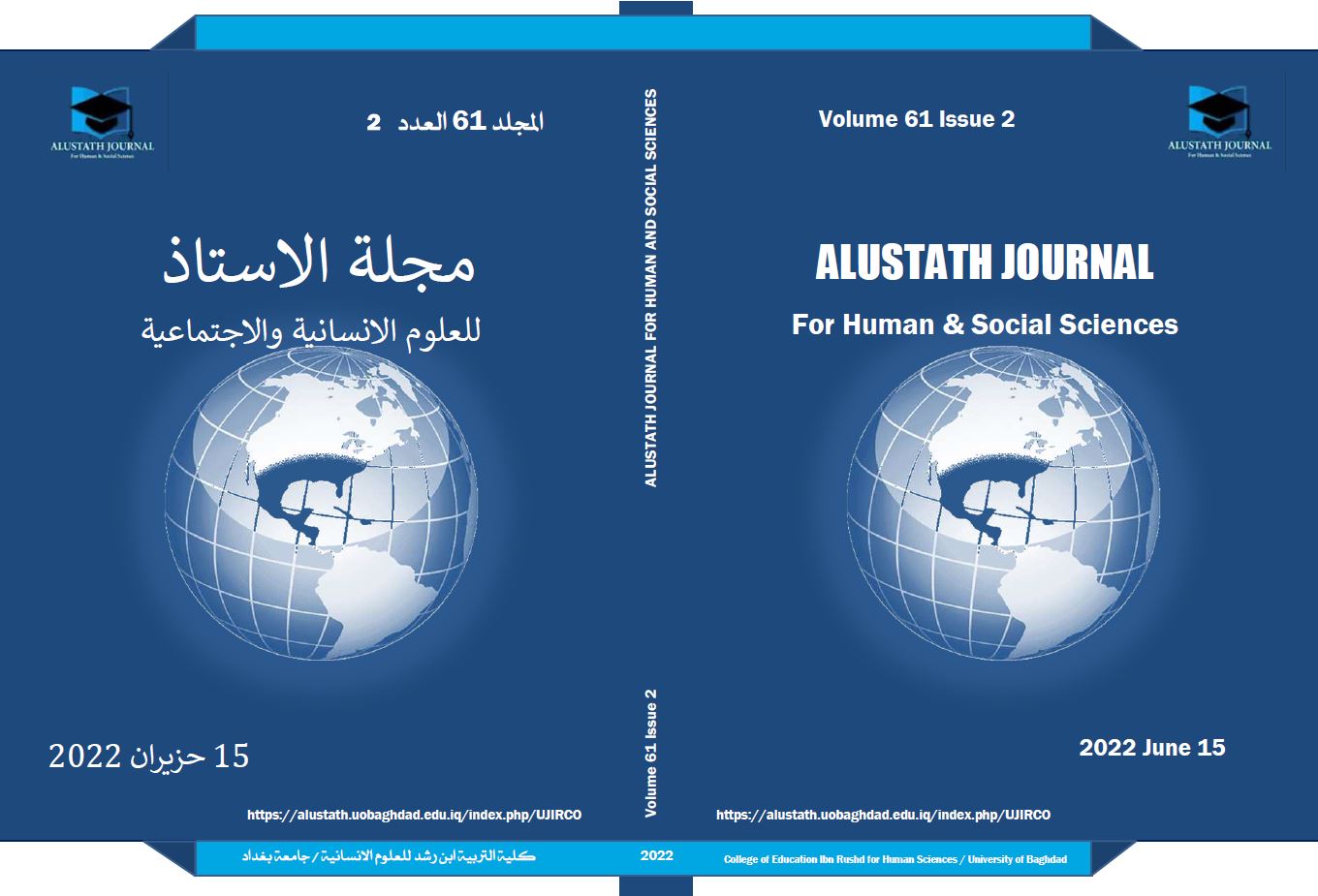معتقدات الذاكرة وعلاقتها بالصمود الأكاديمي لدى طلبة كلية التربية للعلوم الإنسانية بجامعة الموصل
DOI:
https://doi.org/10.36473/ujhss.v61i2.1609الكلمات المفتاحية:
معتقدات الذاكرة _الصمود الاكاديميالملخص
الملخص:
يهدف البحث الحالي التعرف على معتقدات الذاكرة, والفروق ذات الدلالة الاحصائية في معتقدات الذاكرة وفي الصمود الاكاديمي تبعاً لمتغيري الجنس والصف الدراسي, والعلاقة بين معتقدات الذاكرة و الصمود الاكاديمي لدى طلبة كلية التربية للعلوم الانسانية بجامعة الموصل. وتألفت العينة من (683) طالباً وطالبةً, ولتحقيق اهداف البحث تم استخدام اداتي احدهما من اعداد الباحثة وهي مقياس معتقدات الذاكرة ومقياس الصمود الاكاديمي لـ (Cassidy,2016),واظهرت النتائج إن معتقدات الطلبة ايجابية عن ذاكرتهم, وأن الفروق ذات الدلالة الاحصائية كانت غير دالة تبعاً لمتغير الجنس ودالة تبعاً لمتغير الصف الدراسي لصالح طلبة الصف الثاني في معتقدات الذاكرة, وإن الطلبة لديهم صموداً اكاديمياً, وإن الفروق ذات الدلالة الاحصائية كانت دالة تبعاً لمتغير الجنس ولصالح الاناث وغير دالة تبعاً لمتغير الصف الدراسي في الصمود الاكاديمي, وهناك علاقة ارتباطية ايجابية بين معتقدات الذاكرة والصمود الاكاديمي.
التنزيلات
المراجع
• Bandura, A. (1982): Self – efficacy mechanism in human agency, American Psychologist, Vol . 37, No. 2, pp 122-147 .
• Bandura, A. (1977): Self-efficacy: Toward a unifying theory of behavioral change. Psychological Review, 84(2), 191-215.
• Carretti, B, et al.(2011). Impact of metacognition and motivation on the efficacy of strategic memory training in older adults : Analysis of specific , Transfer and maintenance effects . archives of geriatrics , 52, 192 – 197.
• Cassidy, Simon, (2016), The Academic Resilience Scale (ARS-30): A New Multidimensional Construct Measure, Front. Psychol., 18 November,7.1-11.
• Dickinson, Mary J & Dickinson, David A.G, (2014), Practically perfect in every way: can reframing perfectionism for high-achieving undergraduates impact academic resilience?, Published online: 07 May 2014, Pages 1889-1903.
• Dictionary, M.W.C,(2002):Springfield, MA; Merrism Webster.
• Dweck, C. & Legget, E. (1988). A social cognitive approach to motivation and personality. Psychological Review, Vol.95, (pp. 256-273.(
• Dweck, C. S. (2006). Mindset : The New Psychology of Success . New York : Random House.
• Dweck, C.S, (2000):Self - Theories : Their Role In Motivation, Personality And Development, Essayes In Social Psycho, New York.
• Fastame., Maria Chiara,(2013), Exploring the effect of depressive symptoms and ageing on metamemory in an Italian adult sample, Psychology Health and Medicine 19(2).127-135.
• Hertzog, C. Hultsch, D. & Dixon, R. A., (1989), Evidence for The Convergent Validity of Two Self- Report Mea Memory Questionnaires, Developmental psychology: 142.
• Hoge, E.A, et al, (2007), Resilience: research evidence and conceptual considerations for posttraumatic stress disorder, January 2007Depression and Anxiety 24(2):139-152.
• Kalaf, M, (2014),Validity and Reliability of the academic Resilience Scale in Egyptian context, US-CHIN Education Review, 4(3) 202- 210.
• Lineweaver, Berger., T. et al, (2009) Expectations About Memory Change Across the Life Span Are Impacted by Aging Stereotypes, Psychology and Aging 24(1):169-176
• Lockl,K &Schnei,W(2008). Precursors of metamemory in young children the role of theory of mind and metacognitive vocabulary: metacognition and learning, Vol.1, pp.15-31.
• Martin, Andrew & Marsh, Herbert. (2006), Academic resilience and its psychological and educational correlates: A construct validity approach, Psychology in the Schools 43(3):267 - 281.
• Martin, Andrew & Marsh, Herbert.(2009), Academic resilience and academic buoyancy: multidimensional and hierarchica conceptual framing of causes, correlates and cognate constructs, Oxford Review of Education, Volume 35, p.p 353-370.
• Martin, Andrew J,(2013), Academic buoyancy and academic resilience: Exploring ‘everyday’ and ‘classic’ resilience in the face of academic adversity October 2013School Psychology International 34(5):488-500.
• Martin, Andrew. (2002), Motivation and Academic Resilience: Developing a Model for Student Enhancement, Australian Journal of Education 46(1):34-49.
• Martin, Andrew2013), Academic buoyancy and academic resilience: Exploring ‘everyday’ and ‘classic’ resilience in the face of academic adversity, School Psychology International 34(5):488-500.
• McCombs,B. L.(2001): Self-regulated learning and academic achievement, A phenomenological view. In B. J. Zimmerman & D. H.
• Oyoo, S & Mwaura, T.(2018) Predictor a as Resilience of Academic Burnout among Form Four Students in Homa-Bay county, Kenya, International. , Journal of Education and Research,6(3), 187-200.
• Peng Li, , et al .2017 Resilience and Cognitive Bias in Chinese Male Medical Freshmen, Front. Psychiatry, 30 Augus.640- 660.
• Schommer, M. (1998). The Influence Of Age And Education On Epistemological Beliefs. British Journal Of Educational Psychology, Vol.68, (pp. 551-562).
• Von Eye, A, S, (2000), the odds of resilience, Child development, 77,(3),563 -566.












